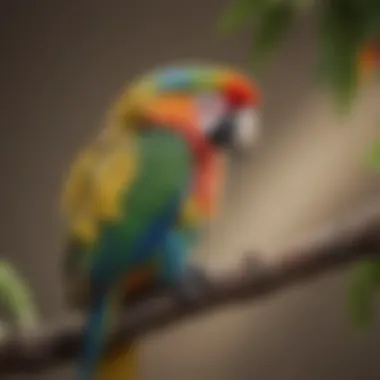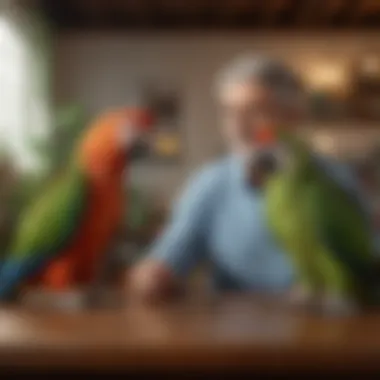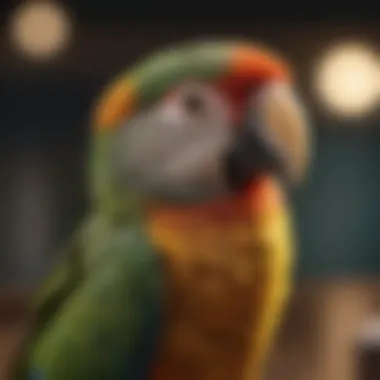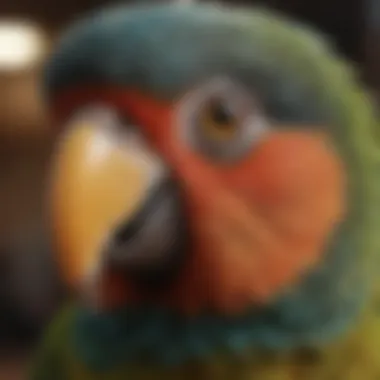Choosing the Optimal Parrot: A Comprehensive Guide


Intro
Choosing a parrot involves more than just selecting a colorful bird. It demands an understanding of their complex behaviors, care needs, and the lifestyle of the owner. This guide aims to provide potential parrot owners with a clear pathway through these components, ensuring a fulfilling partnership with their future avian companions.
Understanding Your Pet
Understanding parrot behavior is the foundation of successful ownership. Parrots are social creatures, known for their intelligence, and can form strong bonds with their owners. However, they require a commitment to learning their needs and quirks.
Pet Behavior Basics
Parrots exhibit a range of behaviors, from squawking to playful antics. Recognizing these behaviors can help in establishing a solid relationship. For instance, a parrot may scream for attention, or display jealousy if it feels neglected. Learning to interpret these signals is essential for fostering a positive environment.
Common Breed Characteristics
Different parrot species possess distinct traits. African Grey parrots, for instance, are renowned for their exceptional intelligence and ability to mimic speech. In contrast, Budgerigars, or budgies, are generally more playful and friendly. Understanding these breed-specific behaviors aids in selecting a parrot compatible with one’s lifestyle.
Species-Specific Needs
Each parrot species has unique requirements, from dietary needs to social interaction preferences. Larger species, like Macaws, often need more space and time dedicated to socialization, while smaller species, such as Lovebirds, might thrive in pairs. Knowing these differences is paramount when considering which species to adopt.
Pet Care and Maintenance
Proper care for your parrot is crucial for its health and well-being. Several factors contribute to the daily maintenance of a parrot that supports its quality of life.
Feeding Guidelines
A balanced diet is vital. Parrots should eat a mixture of pellets, fresh fruits, and vegetables. Avoid feeding them avocado, chocolate, and caffeine, as these can be toxic. Always ensure fresh water is available, as hydration is equally important.
Grooming Essentials
Regular grooming keeps your parrot healthy. Nail trimming and beak care are necessary to prevent discomfort. Additionally, some parrots may need their feathers checked for cleanliness. Grooming should be done gently to avoid distress.
Hygiene Practices
Maintaining a clean environment is essential. Daily cage cleaning helps prevent odors and illness. Weekly deep cleaning of the cage and toys ensures a sanitary living space. Regularly check for mold and debris to keep your parrot healthy.
Training and Development
Training your parrot helps establish good behavior and stimulates its mind. It fosters a relationship built on trust and understanding.
Basic Commands and Skills
Teaching simple commands like
Understanding Parrots as Pets
Understanding parrots as pets is crucial for anyone considering bringing one into their home. These birds are not just colorful companions; they are extremely intelligent creatures that can offer a unique bond with their owners. Recognizing their needs, behaviors, and characteristics helps potential owners make informed choices. Parrots require commitment, attention, and a suitable environment to thrive. Through this understanding, owners can ensure that they meet the parrot's requirements, leading to a happier pet and a more gratifying ownership experience.
The Appeal of Parrots
Parrots are captivating animals with vibrant plumage and engaging personalities. Their ability to mimic human speech is one of the many reasons people are drawn to them. This trait sets them apart from other pets and provides a dynamic interaction. Furthermore, parrots exhibit playful behavior, often engaging in activities that keep their owners entertained. Their social nature makes them excellent companions, capable of forming deep emotional connections. However, their charm comes with responsibilities. An informed approach to ownership is necessary to maintain their well-being.
General Requirements for Parrot Ownership
Owning a parrot involves certain fundamental requirements. Firstly, the space in which they live matters significantly. Parrots need a spacious cage to fly comfortably and a safe area for play. The cage should be large enough for them to stretch their wings and move without restrictions. Also, their environment must be enriched with toys and activities to stimulate their minds.
In addition to physical space, parrots require a varied diet, including fruits, vegetables, seeds, and pellets. Balancing their nutritional needs is vital for their health.
Social interaction is another critical element. Parrots are inherently social creatures and require regular engagement with their owners or companions to remain happy. Owners should be prepared to spend time every day interacting with their parrot.
Ultimately, a commitment to understanding and fulfilling these basic needs will prepare potential owners for the responsibilities that come with parrot ownership. It is important for every new owner to recognize that parrots, while captivating, are complex beings requiring dedicated care.
Factors to Consider When Choosing a Parrot
Choosing a parrot is not a decision to be taken lightly. The commitment involved with parrot ownership demands careful thought and consideration. Understanding the various factors helps prospective owners make informed choices that align with their lifestyles. This section will delve into crucial elements like space requirements, time investment, noise levels, and health considerations that can greatly affect both the parrot and owner satisfaction.


Space Requirements
Parrots require adequate space to live and thrive. Their housing needs vary based on the species. A larger parrot, such as a Macaw, will need significantly more room compared to a smaller bird like a Budgerigar. When selecting a cage, consider the species' wingspan, activity level, and the importance of a stimulating environment. Adequate space allows for exercise and mental engagement. Insufficient room can lead to stress and behavioral issues.
A few essential points to keep in mind include:
- Cage Size: Ensure the cage is spacious enough for movement, including flight.
- Placement: The cage should be positioned in a safe and social area, away from direct sunlight or drafts.
- Toys and Perches: Providing toys and climbing structures can enhance the environment, making it a more inviting space.
Time Commitment
Owning a parrot is a significant time commitment. Unlike other pets, parrots are highly social and intelligent creatures. They require daily interaction and enrichment to remain happy and healthy. This calls for a structured daily routine that includes playtime, training, and social interaction.
Consider the following aspects of time commitment:
- Daily Interaction: Allocate several hours each day for bonding and training. Parrots thrive on companionship, and lack of interaction can lead to behavioral issues.
- Training Activities: Implementing regular training sessions can improve behavior and strengthen your bond with the bird.
- Maintenance: Daily cage cleaning and maintenance, as well as preparing healthy food, add to the time needed for proper care.
Noise Levels
Noise can be one of the most significant challenges when considering a parrot. Many parrots are known for their vocal abilities, which can range from soft chirps to loud squawks. Noise levels are especially critical for those living in apartments or close quarters with neighbours.
Keep in mind these points about noise:
- Species Variation: Different species have varying noise levels. African Grey Parrots, for instance, are known for their mimicry skills and can be especially loud.
- Peak Activity Times: Understand that parrots tend to vocalize more during specific times of the day, namely morning and late afternoon.
- Environmental Impact: A busy or stimulating environment may affect how often and how loudly a parrot communicates.
Health Considerations
The well-being of a parrot extends beyond immediate care; it encompasses long-term health planning. Prospective owners should be prepared to monitor their parrot’s health closely. Regular vet check-ups, a proper diet, and social interactions are key to maintaining good health.
Here are the primary health considerations:
- Diet: Parrots require a balanced diet that includes a mix of pellets, fresh fruits, and vegetables. Proper nutrition plays a vital role in preventing health issues.
- Veterinary Care: Regular vet visits ensure early detection of any potential health problems. Finding a vet that specializes in avian care is crucial.
- Environmental Health: Ensure that the cage and living environment are kept clean to prevent diseases. Regular cleaning and hygiene practices can mitigate health risks.
The right blend of space, time, noise understanding, and health awareness can significantly enhance the experience of parrot ownership.
Overall, these factors are not merely suggestions; they are vital components that dictate the relationship between you and your parrot. Thoughtful consideration of these elements will aid in making the best choice for both you and your future feathered companion.
Popular Parrot Species for Ownership
Selecting the right parrot species plays a significant role in pet ownership. Different species come with varying temperaments, care requirements, and social needs. Understanding these differences is essential to create a conducive environment for both the bird and the owner. This section will explore popular parrot species, highlighting their unique attributes and considerations for prospective owners.
Budgerigar (Budgie)
Budgerigars, commonly known as budgies, are one of the most popular pet birds globally. Their small size makes them suitable for various living situations. Budgies are also known for their friendly demeanor and ability to mimic sounds.
Characteristics:
- Size: About 7 inches long.
- Lifespan: 5 to 10 years in captivity.
- Social Behavior: Enjoy companionship and can bond closely with their owners.
Budgies are relatively easy to care for, needing a simple diet of seeds, fruits, and vegetables. They require a safe cage, some toys for stimulation, and regular interaction. Owners can train budgies to perform tricks or even learn to talk with patience and consistency.
Cockatiel
Cockatiels are affectionate birds, often seen as good options for families. They have excellent social skills, making them suitable companions.
Characteristics:
- Size: Roughly 12 to 14 inches long.
- Lifespan: 10 to 15 years.
- Social Behavior: Generally enjoy social interactions, both with their owners and other birds.
Similar to budgies, cockatiels benefit from a balanced diet rich in seeds, vegetables, and fruits. They thrive on interaction, sometimes displaying head-bobbing or whistling to communicate. Regular handling and socialization create a strong bond with their owners.
African Grey Parrot
African grey parrots are renowned for their intelligence and complex behaviors. They are excellent for those who want an interactive and stimulating pet experience.
Characteristics:


- Size: Around 12 to 15 inches.
- Lifespan: 40 to 60 years, requiring a long-term commitment.
- Social Behavior: Highly social, requiring ample interaction and mental stimulation.
These parrots need a variety of toys and puzzles to keep them engaged. Their diet should consist of high-quality pellets, fresh fruits, and vegetables. They are capable of extensive vocal mimicry, showcasing their intelligence and social needs.
Amazon Parrot
Amazon parrots exhibit vivacious personalities and are known for their vocalizations. These birds can be an exciting addition to an active household.
Characteristics:
- Size: Typically range from 10 to 18 inches.
- Lifespan: 20 to 50 years.
- Social Behavior: Affectionate but can be territorial.
A well-rounded diet includes pellets, nuts, and fresh produce. They enjoy playtime and need toys that challenge their beaks. Proper socialization helps prevent aggressive behaviors and enhances their friendly nature.
Macaw
Macaws are strikingly beautiful, often desired for their vibrant feathers. They are large parrots known for their playful but sometimes demanding nature.
Characteristics:
- Size: Ranges from 18 to 40 inches, depending on the species.
- Lifespan: Can live 50 years or more.
- Social Behavior: Require extensive social interaction and enrichment.
These birds need ample space and enrichment to thrive. A balanced diet consisting of pellets, fruits, and nuts is essential. Potential owners should be prepared for their sociable and sometimes loud personalities.
Lovebird
Lovebirds are small, social birds known for their affectionate nature. Their size makes them suitable for many living situations, but they need companionship.
Characteristics:
- Size: About 5 to 7 inches.
- Lifespan: 10 to 15 years.
- Social Behavior: Highly social, often seen in pairs or small groups.
Lovebirds thrive in pairs, benefiting from social interaction. They require a varied diet including seeds, fruits, and vegetables. Regular engagement is crucial to prevent loneliness and promote mental health.
Choosing the right species can significantly enhance the pet ownership experience. Consider each bird's characteristics, dietary needs, and social requirements for a harmonious relationship.
As a potential owner, understanding these popular species helps in making an informed decision. Matching a parrot's needs with your lifestyle is essential for ensuring a long-lasting bond.
Evaluating Temperament and Behavior
Evaluating the temperament and behavior of a parrot is crucial for potential owners. Unlike many other pets, parrots possess unique personalities and social needs. Understanding these aspects will set a foundation for a happy and lifelong companionship. Making an informed decision based on temperament can lead to reduced behavioral issues and enhanced bonding with your future parrot.
Social Interaction Needs
Parrots are inherently social creatures. Their need for social interaction cannot be overstated. Pet owners should be prepared to provide ample attention and engagement. Many parrot species thrive on interaction, often enjoying playtime and conversation with humans. Neglecting these social needs can lead to loneliness and behavioral issues. A parrot that feels isolated may become noisy or aggressive. When choosing a parrot, consider how much time can be dedicated each day for interacting and bonding.
Key points for social interaction needs:
- Many parrots require several hours of interaction each day
- Birds may become depressed if left alone for extended periods
- Multi-bird households can be beneficial, but still require human interaction
Training Potential
Training is another important aspect of parrot ownership. The ability to train a parrot correlates significantly with its temperament. Some species are more receptive to training than others, leading to successful communication and rule-setting in the household. Cockatiels, for example, are known for their trainability, while African Greys may display a more independent streak. Assessing a parrot’s training potential before purchase can save time and frustration. Owners should also be aware that consistent training sessions are beneficial not just for obedience but also for mental stimulation.
Benefits of training potential:
- Establishes a bond between owner and parrot
- Provides mental stimulation, reducing boredom
- Encourages positive behaviors and discourages negative ones
Understanding Parrot Body Language
Understanding parrot body language is essential for fostering communication. Parrots communicate not only through vocalizations but also through body movements and feather positions. A raised crest may indicate excitement, while a puffed-up appearance can signal a threat. Being attuned to these subtle cues can enhance the owner's ability to respond appropriately to their parrot's mood. Moreover, recognizing signs of stress or comfort can prevent issues like aggression or fear.
Body language cues to note:
- Raised feathers and crest indicate excitement
- Fluffed feathers often denote a defensive posture
- Head bobbing is usually a sign of happiness and willingness to engage


Caring for Your Parrot
Caring for a parrot requires a well-rounded approach. This section explores essential aspects of parrot care, focusing on three key areas: dietary requirements, housing and environment, and health and veterinary care. Understanding these elements is crucial in ensuring your parrot leads a healthy and fulfilling life. Each point not only enhances your pet’s well-being but also strengthens the bond between you and your feathered friend.
Dietary Requirements
A parrot's diet is critical to its overall health. Offering a balanced diet prevents nutritional deficiencies, which can lead to various health issues. Parrots require a mix of seeds, pellets, fruits, and vegetables.
- Seeds: While they are a staple, they should not make up the entirety of the diet.
- Pellets: These should be high-quality and formulated specifically for the species of your parrot.
- Fruits and Vegetables: Fresh produce adds necessary vitamins and minerals. Common choices include leafy greens, carrots, and apples.
It is wise to avoid foods that are toxic to parrots, such as chocolate, avocados, and caffeine. Proper hydration is also vital; clean water should always be available. Many parrot owners benefit from monitoring their bird's eating habits to ensure they are consuming a adequate diet and maintain a healthy weight.
Housing and Environment
Providing a suitable living environment is essential for your parrot's comfort and safety. The cage should be spacious enough for the bird to move freely. Ideally, it should be made from non-toxic materials and be easy to clean. Perches should be of various sizes to promote foot health.
In addition to the cage, consider the following elements:
- Location: The cage should be placed in a quiet area away from drafts but where the parrot can interact with the family.
- Toys: Enrichment items are important for mental stimulation. Chew toys, swings, and foraging toys keep your parrot engaged.
- Cleaning: Regularly clean the cage and surrounding areas to prevent the buildup of harmful bacteria.
Creating a safe and stimulating environment leads to a happier and more active parrot.
Health and Veterinary Care
Routine veterinary care is vital for the health of your parrot. Regular check-ups allow for early detection of health issues. It is important to find a veterinarian who specializes in avian medicine. Important aspects of avian health care include:
- Vaccinations: Some species may require vaccinations to prevent diseases. Consult with your veterinarian about the appropriate vaccines.
- Parasite Control: Regular tests for parasites or worms should be part of your parrot’s health routine.
- Observation: Be vigilant about changes in behavior, eating habits, or physical appearance. Sudden changes can indicate illness.
Regular veterinary visits and attentive care significantly extend the lifespan and quality of life for your parrot.
Overall, effective care leads to a rewarding and incredible relationship with your parrot. Knowledge in these areas ensures that you can better meet the needs of your avian companion.
Potential Challenges of Parrot Ownership
Owning a parrot is fulfilling, yet it comes with distinct challenges that every potential owner should consider. Proper awareness of these challenges can lead to better decision-making and a healthier relationship between the parrot and its owner. Understanding these obstacles can also prevent misunderstandings that may arise later in the ownership experience. It is crucial for prospective owners to evaluate their willingness and ability to manage these issues to ensure the well-being of their feathered companions.
Loneliness and Mental Stimulation
Parrots, inherently social creatures, require regular interaction and mental engagement. Loneliness can lead to a range of behavioral issues, such as excessive screaming or feather plucking. Providing adequate socialization is critical. Consider dedicating time each day to engage with your parrot. This can include talking, playing, or simply providing your parrot with toys that challenge their intellect.
Providing mental stimulation can come from various sources. Interactive toys that require problem-solving can keep a parrot occupied and entertained. Rotating toys and activities can prevent boredom, enhancing their overall well-being. Also, consider the benefits of having more than one parrot, as they can provide companionship to each other.
The key to a happy parrot is consistent engagement and a stimulating environment.
Destructive Behavior
Numerous parrots display destructive tendencies if they lack stimulation. Chewing and shredding household items can become a common issue. This behavior stems from boredom or a lack of appropriate outlets for their instincts. Early training and providing acceptable chewing toys can help redirect these behaviors.
To mitigate destructive habits, owners should reinforce positive actions. Using rewards can effectively shape behavior over time. Additionally, establishing a regular routine can help parrots understand when it is time to play, eat, and interact, thus reducing anxiety that may lead to destructive actions.
Long-term Commitment
Bringing a parrot into your home is not a short-term arrangement. Many species can live for decades, requiring a commitment comparable to adopting a child. This long-term perspective includes ongoing care, socialization, and attention. An ideal owner needs to consider their life stage, future plans, and how a parrot will fit into these changes.
Preparing for a parrot's needs means budgeting for their care, which involves feed, toys, and veterinary expenses. Regular vet visits are necessary for preventive care. If life changes occur, such as moving or job changes, owners must reassess their ability to meet their parrot’s needs. This foresight is vital in ensuring that the parrot remains a cherished part of the family for its entire life.
As you consider these factors carefully, the goal is to foster a thriving and fulfilling relationship with your parrot.
Culmination
The conclusion of this article plays a significant role in summarizing the fundamental aspects discussed regarding parrot ownership. This section encourages potential owners to reflect critically on their choices, considering the vast information presented throughout the guide. It is not merely a wrap-up, but a thoughtful reconsideration of the emotional, social, and practical implications that come with welcoming a parrot into one’s home.
Reflecting on Your Choice
When selecting a parrot, it is crucial to engage in a thorough reflection about your decision. Owning a parrot requires a considerable commitment of time and resources. It is not sufficient to simply admire the beauty of these birds; prospective owners must consider the specific needs of the species they are interested in. This includes evaluating their own lifestyle, living space, and the emotional investment they are prepared to make.
Moreover, understanding the behavior and temperament of different parrot species can lead to a fulfilling companionship. Each parrot has its unique character traits, and some may be more suited to families with children, while others might thrive better in quieter environments.
Reflecting on this choice also involves considering potential challenges, such as the risk of loneliness or destructive behavior if the parrot does not receive adequate interaction and stimulation. Additionally, recognizing that care extends beyond initial purchase—housing, dietary, health check-ups—should shape your decision. A quality commitment ensures not only the well-being of the bird but also enriches the relationship between you and your feathered companion.
In essence, this reflective process aims to guide you towards making an informed, responsible choice that aligns with your capabilities and interests, ultimately resulting in a rewarding experience of parrot ownership.







